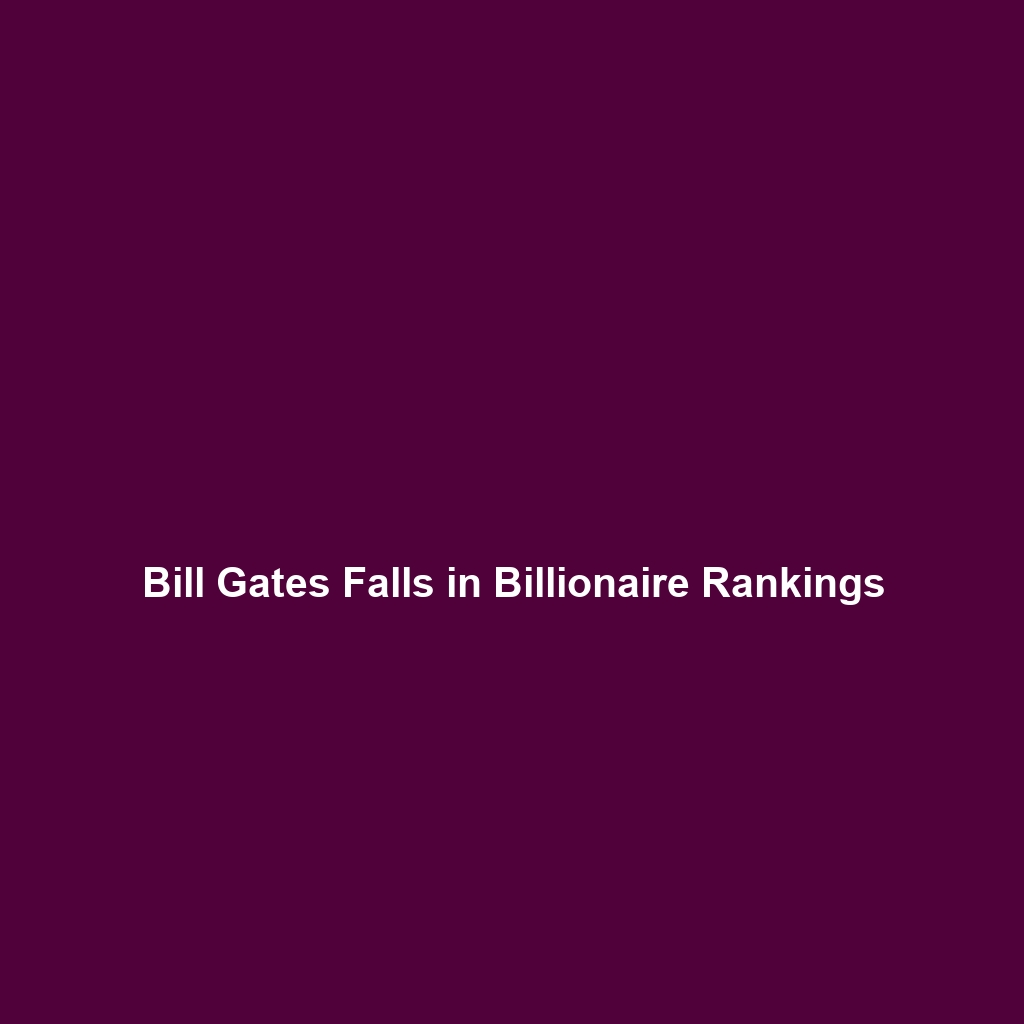Your cart is currently empty!
Tag: public health

MacKenzie Scott Donates $500M to Global Health Programs
<>
MacKenzie Scott Donates $500M to Global Health Programs
MacKenzie Scott Donates $500M to Global Health Programs
In a landmark philanthropic move, MacKenzie Scott, the ex-wife of Amazon founder Jeff Bezos, has pledged $500 million to global health initiatives aimed at combating malnutrition and preventable diseases. This significant contribution underscores Scott’s commitment to supporting health programs that address pressing global health challenges.
Targeting Malnutrition and Preventable Diseases
Scott’s $500 million donation will support a range of organizations and initiatives that focus on alleviating malnutrition and preventing diseases that disproportionately affect vulnerable populations. The funds will be distributed amongst various non-profit organizations working in areas such as food security, maternal and child health, and infectious disease prevention.
According to the World Health Organization (WHO), nearly 690 million people are undernourished globally, a number that has been exacerbated by the COVID-19 pandemic. Scott’s donation aims to not only address the immediate effects of malnutrition but also tackle the broader systemic issues that contribute to it.
The Importance of Philanthropic Support
Philanthropic contributions are critical in the fight against public health crises, particularly in low-income countries where funding is limited. Experts argue that private donations like Scott’s can be pivotal for programs that might not receive priority in government budgets.
Dr. Sarah Thompson, a public health professor at Johns Hopkins University, remarked, “Scott’s donation comes at a crucial time when global health systems are still recovering from the impacts of the pandemic. It sends a strong message that investing in health equity is a global priority.”
Scott’s Philanthropic Journey
Since her divorce from Bezos in 2019, Scott has emerged as one of the most prominent philanthropists in the world. Her giving approach is characterized by a commitment to providing unrestricted funds to organizations rather than directing donations toward specific projects. This trust-based model enables organizations to allocate resources where they are most needed.
Scott has previously donated billions to various causes, including education, racial equity, and economic mobility, underscoring her focus on systemic change. Her latest donation reflects her ongoing dedication to improving health outcomes globally.
Potential Impact of the Donation
The $500 million donation is expected to significantly enhance the capabilities of organizations like Partners in Health and the Global Fund, which are crucial in delivering health services and resources to underserved communities. The contribution can help fund innovative health interventions and further research on health disparities.
The Global Fund, which focuses on combating AIDS, tuberculosis, and malaria, expressed gratitude for the donation, highlighting that the funds will help ensure health equity and access for marginalized populations. “With this level of financial commitment, we can scale our efforts and reach more communities in need,” stated Dr. Mark Dybul, a former executive director of the Global Fund.
Challenges Ahead
Despite the positive reception of Scott’s donation, significant challenges remain in the global health landscape. Malnutrition and preventable diseases are deeply intertwined with factors such as poverty, education, and access to healthcare. Simply injecting funds into these issues may not be sufficient without concurrent efforts to address these underlying factors.
Health experts stress that collaborative approaches, involving governments, NGOs, and the private sector, are essential to create sustainable change. For Scott’s donation to have lasting impact, it may need to be part of a broader strategic initiative that includes policy reforms and grassroots engagement.
Future of Philanthropy
Scott’s donation aligns with a broader trend in philanthropy that emphasizes the need for urgent action around health equity. As more individuals of wealth commit to the cause, there is potential for transformative impact on global health systems.
This shift is particularly relevant as the world continues to confront the long-term consequences of the COVID-19 pandemic, which has disproportionately affected vulnerable populations. Philanthropy will play a critical role in mobilizing resources to mitigate these impacts and support recovery efforts.
In conclusion, MacKenzie Scott’s $500 million donation offers hope for global health programs addressing malnutrition and preventable diseases. As organizations work to implement these funds effectively, the emphasis will be on creating sustainable solutions that extend beyond immediate relief efforts. With continued commitment from major philanthropists, there is potential for significant advancements in global health equity.

Bill Gates Falls in Billionaire Rankings
Bill Gates Falls in Billionaire Rankings
Bill Gates Falls in Billionaire Rankings
In a recent update to the Bloomberg Billionaires Index, Bill Gates has dropped to sixth place as the world’s richest person, a position he has not held since 2017. This change comes amidst a period of rapid technological advancements, particularly within artificial intelligence (AI), which has seen Gates’s wealth diminish relative to competitors in the tech sector, notably Elon Musk and others capitalizing on the AI revolution.
Gates’s Wealth Shift
Bill Gates, co-founder of Microsoft, has witnessed a significant shift in his financial standing. As of early October 2023, Gates’s net worth is estimated at $114 billion, a stark contrast to the approximately $126 billion held by Elon Musk, who has reclaimed the top position in billionaire rankings. The surge in tech stocks, particularly those linked to AI innovations, has propelled competitors ahead of Gates, pushing him down the list.
The emergence of AI as a growth sector has transformed the dynamics of wealth in technology. Companies like OpenAI, founded by Elon Musk and Sam Altman, and others such as Google and Amazon have experienced exponential growth due to their investments in AI technology. This acceleration has left Gates, who has shifted focus to philanthropic efforts through the Bill and Melinda Gates Foundation, at a disadvantage in the competitive landscape of tech billionaires.
The Tech Landscape Shift
The rapid advancements in AI technology are not only reshaping how businesses operate but also influencing the financial trajectories of key figures in the sector. With generative AI gaining popularity, firms specializing in such technologies have seen their valuations soar. Musk’s ventures, including Tesla and SpaceX, have benefited tremendously from this trend. According to an analysis by Forbes, Tesla’s stock price increased by more than 50% over the past six months, attributing much of that growth to the company’s foray into AI-driven applications.
In contrast, Microsoft, under Gates’s original stewardship, has seen fluctuations in its stock price, particularly after announcing layoffs and restructuring within its own divisions. The tech giant has engaged in AI development but faces stiff competition in this newly dynamic field. Experts suggest that Gates’s approach toward AI has not resonated as strongly as those of his competitors, leaving him at a crossroads regarding whether to return to a more direct involvement in tech.
Billionaire Rankings and Economic Indicators
The billionaire rankings serve not only as a measure of personal wealth but also as an indicator of broader economic trends within the tech sector. This recent shift highlights a transformative moment in technology, where innovation drives extreme wealth accumulation with unprecedented speed. A report by PwC indicates that the tech sector’s growth is not likely to slow down anytime soon, particularly in AI and machine learning, reinforcing the need for legacy companies, such as Microsoft, to adapt more rapidly to maintain their competitive edge.
According to Dr. Ayesha Khanna, co-founder of the advisory firm Addo AI, “The future of technology management is not just about software, but about leveraging the latest advancements in AI to solve modern challenges. Companies and individuals who adapt to this shift will thrive.” For Gates, being outside of the top tier of billionaire rankings could signify a need to reassess his current tech engagements and perhaps reconsider a more active role in emerging tech trends.
Philanthropy: A Different Focus
While Gates’s financial decline may be noted in billionaire rankings, it masks his significant influence in philanthropy and public health. The Bill and Melinda Gates Foundation, which focuses on global health issues and poverty alleviation, has contributed billions towards vaccine distribution and education reform, particularly post-pandemic. Gates’s commitment to philanthropy represents a strategic detachment from the fast-paced world of tech competition, which might be at odds with his philanthropic mission.
Gates himself has remarked on the importance of prioritizing global well-being over personal wealth accumulation. In a recent interview, he stated, “Wealth isn’t everything; the impact you create matters more.” This perspective raises questions about whether he will continue to see declines in his financial ranking, or if a renewed focus on technological engagement might drive him back up the list.
Conclusion: The Road Ahead for Gates
The shift in billionaire rankings is reflective of current economic realities defined by technological advancement and innovation. For Bill Gates, the drop to sixth place highlights the rapid pace of change and the intense competition within the technology sector, particularly from AI-driven companies. As he navigates the intersection of philanthropy and technology, it remains to be seen whether Gates will recalibrate his strategy to adapt to the shifting landscape of wealth and influence.
Continued surveillance of the tech sector will be crucial, as the companies associated with AI continue to dominate both headlines and wealth rankings. Gates’s past experience and current endeavors position him to possibly reclaim his stature, but significant shifts in strategy and engagement will be essential to meet the challenges posed by emerging competitors.

Brad Jacobs
Brad Jacobs – Profile
Brad Jacobs – Profile
Brad Jacobs is a renowned billionaire with influence across industries such as logistics and transportation. As of 2024, his estimated net worth is $3.2 billion USD. Known for key ventures like XPO Logistics, Brad Jacobs has made a significant impact through innovative leadership. Recent achievements include expanding operations and enhancing supply chain technologies.
Personal Stats
- Net Worth: $3.2 billion USD
- Age: 65
- Source of Wealth: XPO Logistics, transportation and logistics
- Self-Made Score: 10/10
- Philanthropy Score: 8/10
- Residence: Greenwich, Connecticut
- Citizenship: United States
- Marital Status: Married
- Children: 3
- Education: B.A. in Political Science from the University of Pennsylvania
Net Worth and Wealth Sources
The current net worth of Brad Jacobs stands at $3.2 billion USD, with wealth primarily derived from companies like XPO Logistics and Jacobs Private Equity. Other revenue sources include strategic investments in various sectors, including technology and healthcare.
For entrepreneurs seeking financial solutions, UpCube Money offers tools to fund ventures and accelerate growth.
Career Breakthrough and Key Ventures
Brad Jacobs first gained prominence with the launch of XPO Logistics in 2011, paving the way for future achievements. His portfolio includes influential companies such as Con-way Inc. and customers across various sectors, transforming industries like transportation and logistics.
Philanthropy and Social Impact
Beyond business, Brad Jacobs is involved in philanthropy, focusing on causes like education and public health. He has donated to organizations such as the United Way and local initiatives aiming at improving community welfare and economic development.
Personal Life and Public Persona
Brad Jacobs resides in Greenwich, Connecticut and holds citizenship in the United States. His personal life has drawn public attention, including his marriage to Patricia Jacobs and parenting three children. He is known for engaging with followers on platforms like LinkedIn and Twitter (now X).
Recent Achievements and Challenges
In 2024, Brad Jacobs reached significant milestones, including the strategic acquisition of several logistics firms to bolster XPO€„¢s market presence. However, he also faced challenges, such as navigating supply chain disruptions amid global economic fluctuations. Despite obstacles, he continues to pursue innovative projects and ambitious goals.
Legacy and Future Plans
Looking ahead, Brad Jacobs plans to expand his influence through projects like enhancing transportation automation and sustainability initiatives. His long-term vision includes shaping the logistics industry and leaving a meaningful legacy through business innovation and philanthropy.
Brad Jacobs’s journey from a rising entrepreneur to becoming a global billionaire showcases his determination and innovation. As he continues shaping industries and pursuing ambitious goals, the world watches to see what comes next.






